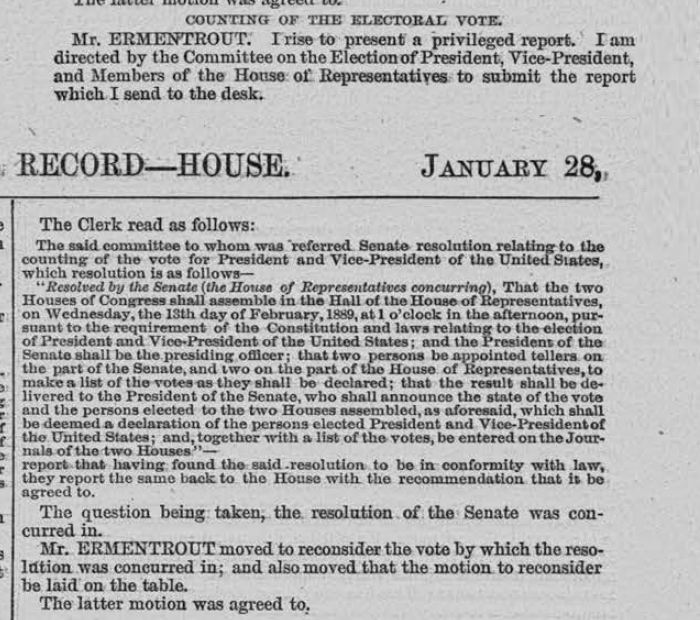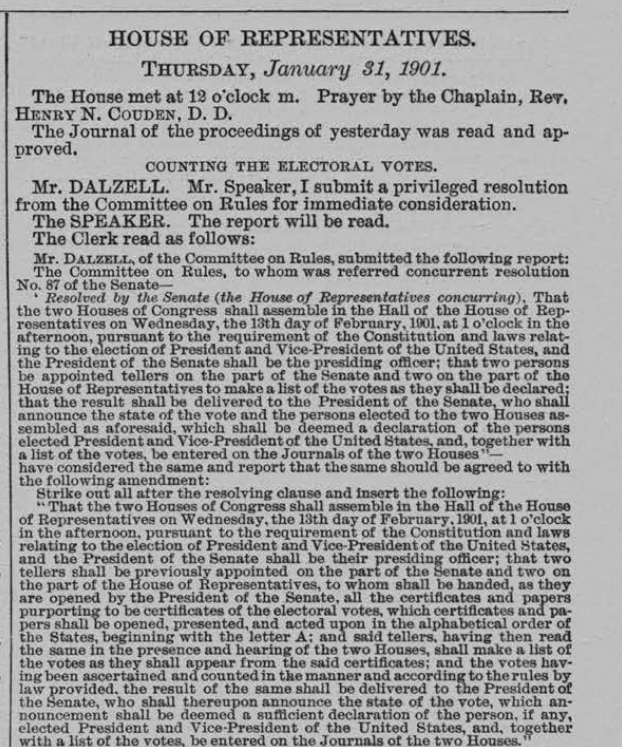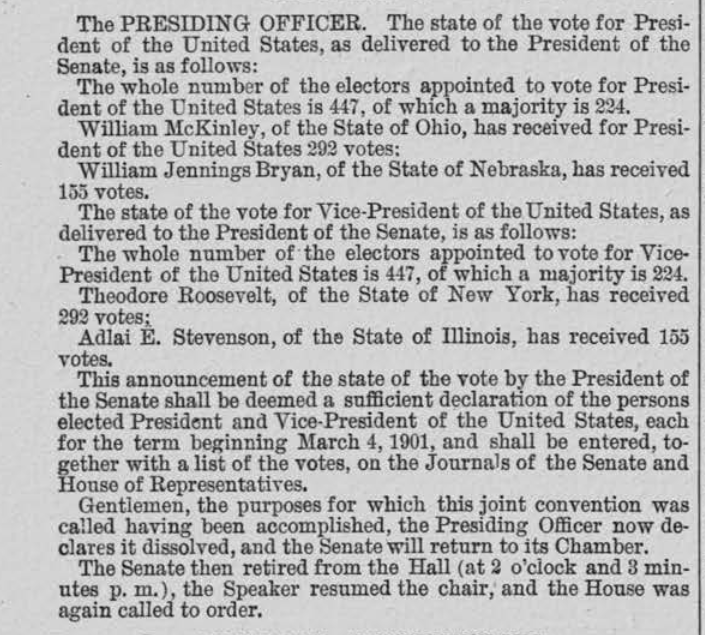FUN FACT: While the Electoral Count Act sets rules for how Congress counts the electoral votes to thereby determine who won the presidential election, and while the ECA is (indeed) a law… the House and (/or) Senate can choose to ignore those rules.
But fear not!
A thread…
1/
But fear not!
A thread…
1/
When the House & Senate create (literal) new rules, they typically do so by directly amending their respective official Rules & publishing them in their respective rule books.
2/
2/
But, they can instead create rules – rules that have no greater authority than any other rules of the House & Senate – by enacting them into law & having them codified in the US Code – which is what they did with the Electoral Count Act.
3/
3/
And so while the ECA has the authority of a statute as to everyone else, its provisions establishing the rules of the joint session (and the rules of the House & Senate when they meet separately to resolve objections) are but rules & so may be changed like any other rules.
4/
4/
And the fact the Congress-related provisions of the ECA are but rules helps explain why, despite the ECA saying the House & Senate shall meet in the House Chamber at 1pm on Jan 6… they don't just show up there & meet at 1pm on Jan 6. They do it pursuant to a resolution…
5/
5/
Or as the authoritative Deschler's Precedents explains it: The joint session is convened "pursuant to" a concurrent resolution of the two Houses (ie, not pursuant to law) "which incorporates by reference" the applicable provisions of law (ie, the Electoral Count Act).
6/
6/
(To those following along: I'm laying out these background details as a lead in to explain the sorts of unusual maneuvers various Trump supporters might try (starting as early as Jan 3) and the ultimately fatal impediments they will encounter...
7/
7/
... because I've found that a lot of this is counter-intuitive, to both lawyers and non-lawyers, especially the notion that Congress may ignore rules of procedure even if those rules are embodied in a statute.)
8/
8/
So, ever since the ECA was enacted in 1877, Congress has convened to count the electoral votes pursuant to a concurrent res which A) repeats the basic provisions of the ECA (some verbatim) and 2) as Deschler's puts it, incorporates the rest by reference.
Now you might ask...
9/
Now you might ask...
9/
"Ira, you've said Congress is free to ignore the provisions of the ECA, but has that ever actually happened?"
Yes, it has. In 1893 and 1897.
10/
Yes, it has. In 1893 and 1897.
10/
Despite what generally well-considered sources of basic facts have said, the Vice President does NOT declare a winner. Rather, he announces "the state of the vote" – ie, how many electoral votes each candidate received – and from that we have to figure who won.
11/
11/
This may seem a minor point, but when Congress was considering enacting the ECA, it was a major concern of the House which insisted "the [election] result [be] dependent upon the vote itself and not upon the judgment of the presiding officer."
12/
12/
Yet, while the then-newly enacted ECA told the President of the Senate just to announce the vote, as you can see here, in 1889 the House & Senate agreed to a con res that told him to announce the vote "and the persons elected" and that's what he did.
Same in 1893 & 1897.
13/
Same in 1893 & 1897.
13/
As to whether the House just wasn't paying attention in 1889, 93 & 97, they were in 1901 – and this time when the Senate sent over its con res, the House amended it to follow the terms of the ECA (ie, don't announce the winner), the Senate agreed, and all went well.
14/
14/
The point here is: When Congress convened to count the electoral votes in the 3 elections after enactment of the ECA, they followed the terms of 3 concurrent resolutions they'd agreed to, not the terms of that new statute – which may seem strange, but to Congress it isn't.
15/
15/
What does this all mean for Ted Cruz et al?
First, if the H & S agree to a standard con res that follows the terms of the ECA, what Cruz SEEMS to be planning – eg a motion to suspend the joint session "until [an] emergency 10-day audit is completed" – would be out of order.
16/
First, if the H & S agree to a standard con res that follows the terms of the ECA, what Cruz SEEMS to be planning – eg a motion to suspend the joint session "until [an] emergency 10-day audit is completed" – would be out of order.
16/
He'd offer such a motion in the Senate – after an objection was made in the JS & the JS recessed to allow the House & Senate to separately vote Yea/Nay on the objection. His motion could be in order only 1) by unanimous consent (Ha!), or 2) if a majority voted to allow it.
17/
17/
Of course the House wouldn't agree to do the same... but if somehow (it WON'T happen) a Senate majority did vote to allow his motion and in favor of his motion, IN THEORY the Senate could refuse to reconvene until some sort of "Electoral Commission" did something or other.
18/
18/
But, hang on: Instead of waiting for Jan 6, Cruz could launch his plan as soon as McConnell makes a motion to consider the JS con res – as early as Jan 3 or 4. 
Ie, Cruz could try to offer an amendment to the con res that would make his Jan 6 maneuver in order.
19/

Ie, Cruz could try to offer an amendment to the con res that would make his Jan 6 maneuver in order.
19/
And if McConnell wouldn't let Cruz do that, Cruz could filibuster the con res (I can't say for sure, but afaik that's never happened before), requiring McConnell to assemble 60 votes for cloture.
20/
20/
Alt approach: McConnell could call up a con res with provisions that would block Cruz & others from slowing the process. Eg, instead of each objection in the joint session being considered by the H & S for 2 hours each, the con res could require "batch processing"...
21/
21/
With batch processing, any objections to each state's electors would all be heard in series in the joint session, and then only after all were heard would the JS recess so that the House & Senate could each separately debate and vote on them (eg) in one 2-hour session.
22/
22/
Batch processing, with just one combined debate-and-vote session, would be an alternative to what the ECA calls – ie, each objection is followed by a recess, then separate 2-hour House & Senate debates, then separate votes.
23/
23/
If Cruz & Hawley (& House members) object in the JS to 6 states' electors, under the ECA that would mean up to 12 hrs of debate (ie, into Jan 7), while if McConnell could get 60 votes, he could pass a res that allowed the objections but would take way less time to resolve.
24/

24/
McConnell could even go further and specially craft a con res with a provision requiring only one vote for all 6 objections – ie, forcing Repubs to take only one roll call vote against Trump instead of 6.*
(* – and making out of order any request for a division)
25/
(* – and making out of order any request for a division)
25/
Whether Cruz, et al. or McConnell are planning to futz* with the con res in any of the ways I've outlined, I don't know. But I mention them b/c those possibilities mean the fun could start before Jan 6. Even as soon as tomorrow afternoon, Jan 3. 
(* – technical term)
26/

(* – technical term)
26/
Oh... What if Cruz did successfully filibuster the con res past 1pm on Jan 6? Could the joint session still convene then simply on the basis of the provisions in the ECA?
While (afaik) that hasn't happened since the ECA was enacted in 1887, I don't see why not.
27/
While (afaik) that hasn't happened since the ECA was enacted in 1887, I don't see why not.
27/
UPDATE: McConnell did not try to change the joint session res from it's usual plain vanilla form to better block Cruz, while Cruz didn't try to change it so that his announced plan to delay the count for an Electoral Commission would be in order.
28/ https://twitter.com/kyledcheney/status/1345788790879756295
28/ https://twitter.com/kyledcheney/status/1345788790879756295
McConnell doing nothing special with S Con Res 1 makes some sense: Push it through w/o any mess, then on Jan 6 (& 7) shut Cruz down by regular order – ie, by the presiding officer ruling motions Cruz might make to be out of order.
29/
29/
But Cruz doing nothing special (eg, seeking to amend S Con Res 1 or filibustering it until he worked out some deal w/ McConnell) says he's planning to do the least amount possible to get his "I Stood With Trump" ticket punched, then moving on.
30/
30/
It seems safe to assume Cruz knows his scheme will fail, but when offered a chance to make news today and on the 6th (& 7th) or just on the 6th (& 7th), he picked the latter.
31/
31/

 Read on Twitter
Read on Twitter
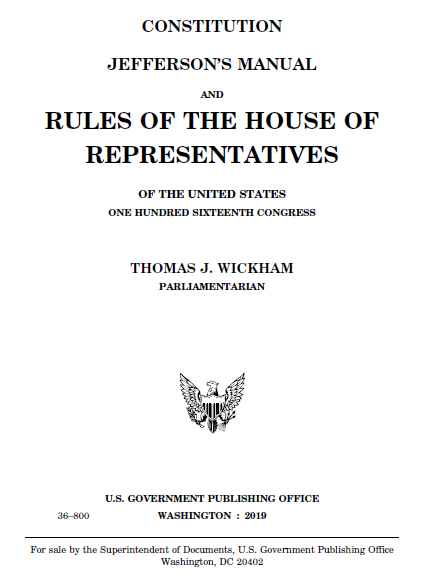
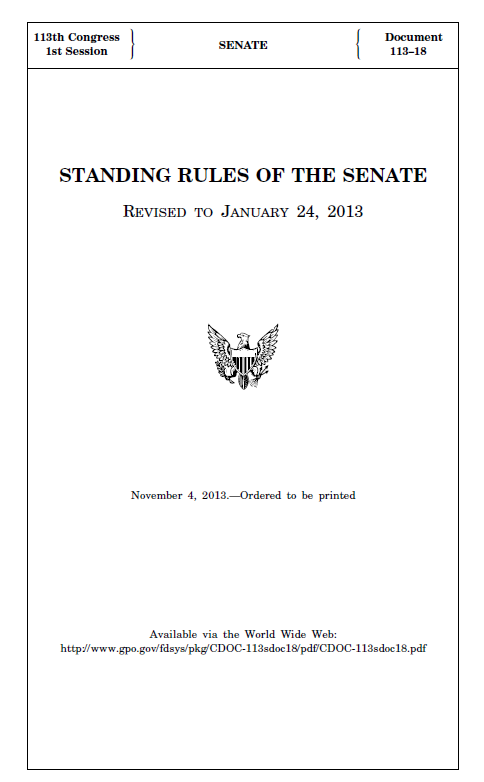
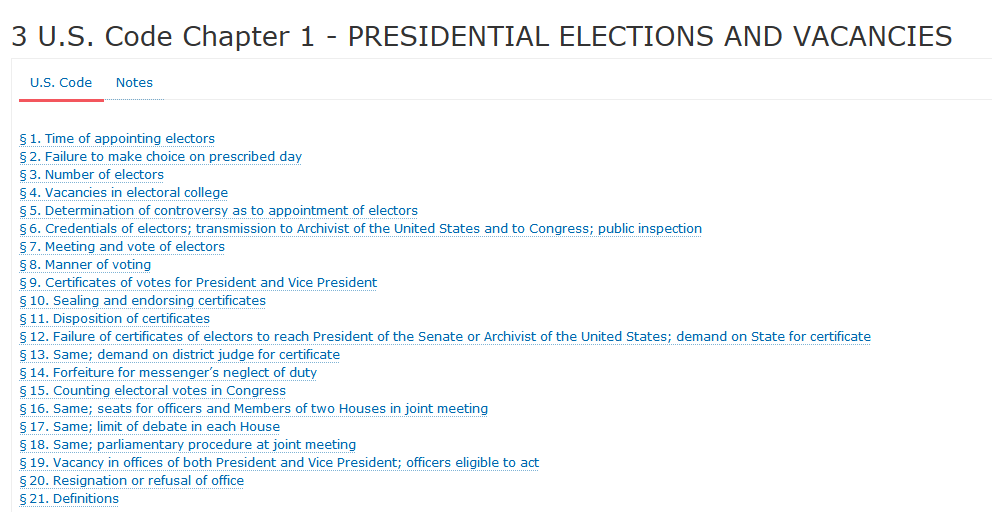
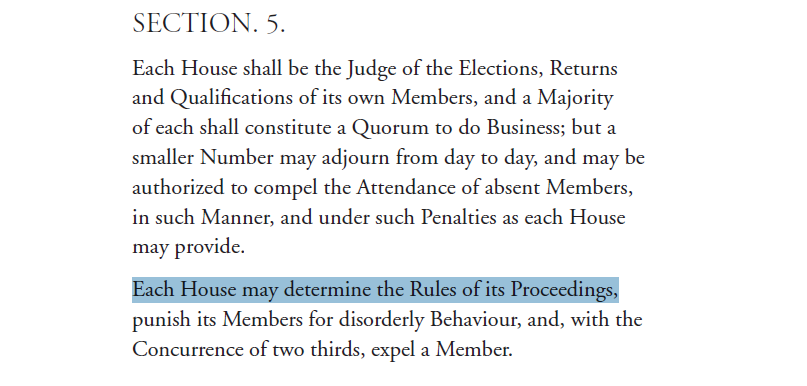


![This may seem a minor point, but when Congress was considering enacting the ECA, it was a major concern of the House which insisted "the [election] result [be] dependent upon the vote itself and not upon the judgment of the presiding officer."12/ This may seem a minor point, but when Congress was considering enacting the ECA, it was a major concern of the House which insisted "the [election] result [be] dependent upon the vote itself and not upon the judgment of the presiding officer."12/](https://pbs.twimg.com/media/EqxXJsmXYAECbVb.png)
